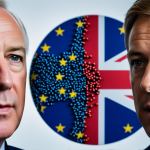Immediate Effects of Brexit on UK-Europe Trade
Brexit impact on UK-EU trade was immediate and significant. Before Brexit, trade between the UK and Europe flowed with minimal customs changes, benefiting from the seamless single market. Post-Brexit, new customs procedures and regulatory checks were introduced, disrupting longstanding arrangements. These changes meant businesses faced unfamiliar paperwork, additional inspections, and delays at borders.
The introduction of customs declarations and regulatory compliance requirements increased administrative burdens. Many UK exporters and importers had to adapt quickly to manage these customs changes, which created Brexit trade disruptions affecting supply chains and delivery schedules. For example, food and drink industries experienced complex sanitary and phytosanitary checks, elevating costs and time.
Have you seen this : How Does the UK Media Impact Public Opinion on Political Issues?
These immediate adjustments required firms to invest in new systems and training. SMEs found adaptation especially challenging, lacking resources compared to larger companies. Overall, Brexit impact on trade was felt through increased friction at the border, escalating operational complexity, and the need for businesses to navigate changing regulatory landscapes. The short-term consequences illuminated how deeply intertwined UK-EU trade was, making the transition complex for many sectors.
Changes in Trade Agreements and Tariffs
Brexit led to the establishment of the UK-EU Trade and Cooperation Agreement (TCA), defining the new framework for UK-EU trade agreement post-Brexit. This agreement allows tariff-free and quota-free trade for goods that meet the relevant rules of origin, reducing Brexit tariffs but introducing non-tariff barriers such as customs declarations and regulatory checks.
Also to read : How Will Climate Change Affect the Future of the UK?
Unlike the seamless trade before, the TCA requires businesses to prove the origin of products to qualify for zero tariffs. If these conditions are unmet, Brexit tariffs may apply, increasing costs, particularly impacting sectors like automotive and agriculture. For example, UK car exports to the EU face stricter content rules, potentially driving up costs and complicating supply chains.
The services sector, crucial for the UK economy, experienced fewer concrete benefits, as the TCA offers limited market access compared to EU membership. Financial services, in particular, confront uncertainty due to lack of equivalence decisions.
Overall, the TCA modified trade policy to balance tariff elimination against increased procedural complexities. This trade agreement reshaped UK-EU trade by eliminating tariffs on many goods but introduced new administrative burdens that businesses must navigate carefully to avoid Brexit trade disruptions.
Customs Procedures and Border Controls
Since Brexit, customs processes between the UK and EU have become significantly more complex. The introduction of mandatory customs declarations and rigorous border checks replaced the previous frictionless trade environment. Businesses must now submit detailed paperwork for imports and exports, including proof of origin and compliance with regulatory standards.
These requirements have led to delays and increased costs across supply chains. For example, perishable goods like food and drink face heightened border checks, risking spoilage due to longer transit times. Companies also encounter unpredictable waiting periods at ports, complicating logistics planning.
The need to manage these customs procedures has prompted many firms to invest in specialized systems and hire customs experts, particularly impacting SMEs less equipped to handle these challenges. On the supply chain front, delays and uncertainty force adjustments in inventory management and transport scheduling.
Government and industry initiatives aim to streamline customs processes, through digitalizing declarations and simplifying compliance. However, Brexit logistics continues to pose hurdles, as businesses balance regulatory demands with efficient trade. Understanding these evolving customs changes is essential for navigating current and future UK-EU trade dynamics effectively.
Immediate Effects of Brexit on UK-Europe Trade
Before Brexit, UK-EU trade operated with virtually no customs barriers, benefiting from the single market’s efficiency. This seamless system allowed goods to cross borders freely, minimizing delays and paperwork. However, the moment Brexit took effect, new customs changes disrupted this flow.
Businesses suddenly faced a maze of customs declarations, regulatory compliance checks, and border inspections. These adjustments led to immediate Brexit trade disruptions, including increased transit times and higher administrative costs. For example, companies handling perishable goods encountered risks of spoilage due to border delays.
The disruption was especially pronounced for small and medium-sized enterprises (SMEs), which often lacked the resources to swiftly adjust to the evolving requirements. Larger firms invested in customs expertise and systems, but many businesses endured uncertainty and operational challenges.
In summary, Brexit’s immediate impact transformed established supply chains with more complex customs protocols. The resulting friction highlighted the reliance UK companies had on a frictionless European trade environment. Businesses had to rapidly modify processes to manage these customs changes, navigating a new landscape marked by delays, additional paperwork, and evolving regulations.
Immediate Effects of Brexit on UK-Europe Trade
Before Brexit, UK-EU trade thrived on frictionless customs arrangements within the single market, enabling swift movement of goods without border checks. The introduction of customs changes after Brexit instantly disrupted this flow. Businesses had to navigate new customs procedures including mandatory declarations and regulatory checks that did not exist before.
These changes caused immediate Brexit trade disruptions such as delays at borders and increased administrative tasks. For instance, exporters faced longer processing times and complex paperwork, which elevated costs and risked supply chain reliability. Perishable goods were especially vulnerable to these obstacles.
The abrupt shift demanded rapid adaptation from companies. Larger firms invested in customs expertise and digital systems, while many SMEs struggled, lacking adequate resources. This disparity highlighted how Brexit impact unevenly affected the business landscape.
In summary, the swift imposition of customs controls and regulatory barriers transformed the seamless trade environment. Firms were compelled to redesign logistics and compliance strategies to cope with heightened complexity and uncertainty in UK-EU trade. This immediate disruption underscored the depth of integration prior to Brexit and the challenges posed by new customs realities.
Immediate Effects of Brexit on UK-Europe Trade
Before Brexit, UK-EU trade benefited from a nearly seamless system with minimal customs formalities, allowing goods to move freely. The sudden introduction of customs changes disrupted this flow significantly. New requirements mandated detailed customs declarations and strict regulatory checks, complicating established trading routines.
This shift caused immediate Brexit trade disruptions. Businesses, particularly those dealing with perishable goods, experienced delays at borders, increasing risk of spoilage and operational costs. These disruptions also led to elevated administrative burdens, forcing companies to allocate more resources to manage compliance and paperwork.
Small and medium-sized enterprises (SMEs) were disproportionately affected. Unlike larger firms that could invest in customs expertise and digital infrastructure, SMEs often struggled to adapt quickly to these evolving customs procedures. Many faced heightened uncertainty, grappling with unfamiliar processes amid changing rules.
Additionally, the need for updated logistics management became paramount as border delays complicated supply chain reliability. Firms had to reassess transport schedules and inventory strategies to mitigate the impact of longer transit times and unpredictable clearance.
The Brexit impact on trade thus revealed the extensive integration within the UK and EU supply networks, showing how new customs hurdles instantly reshaped commercial activity.


